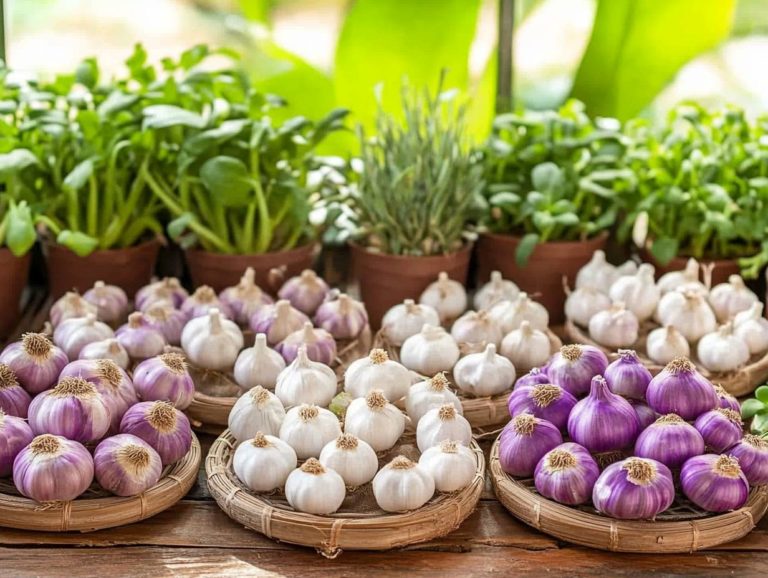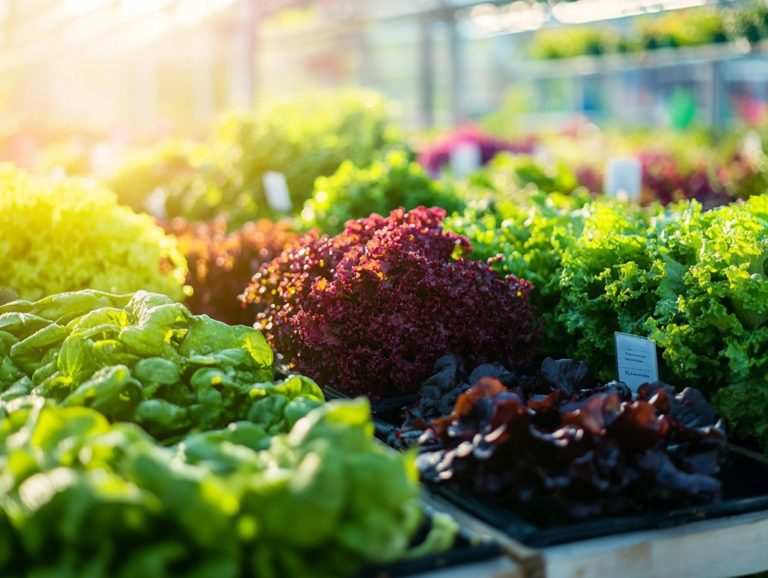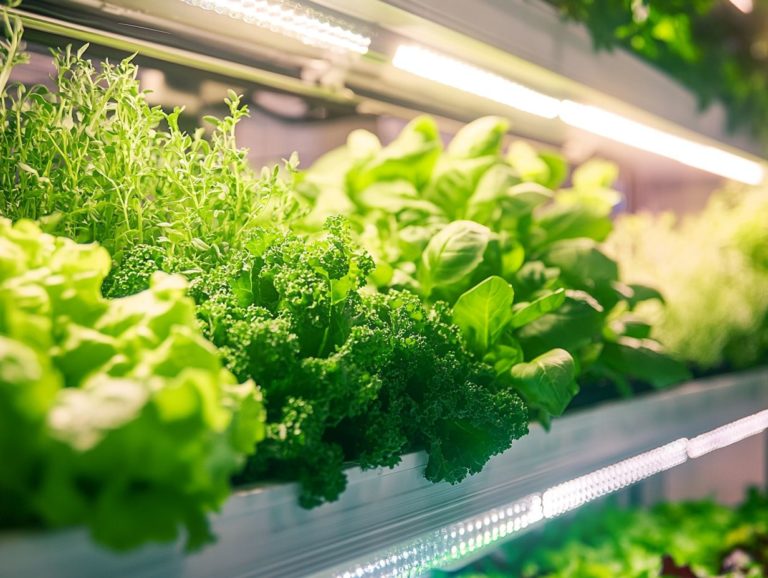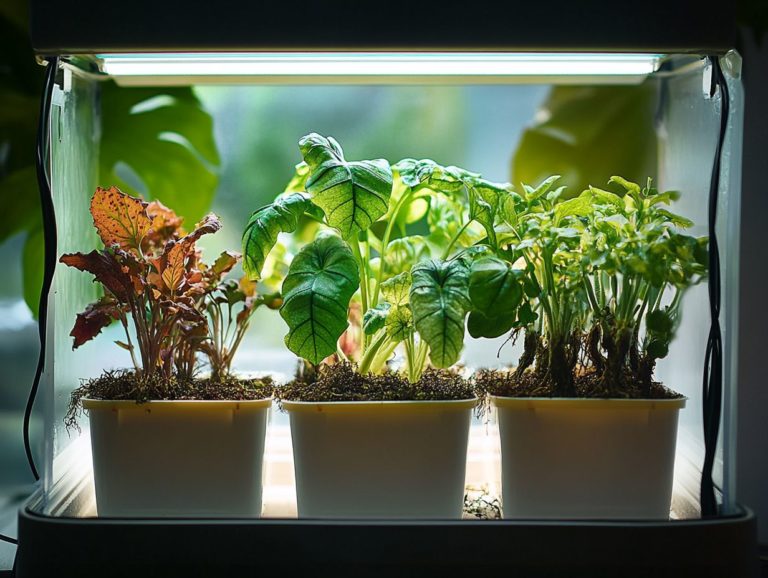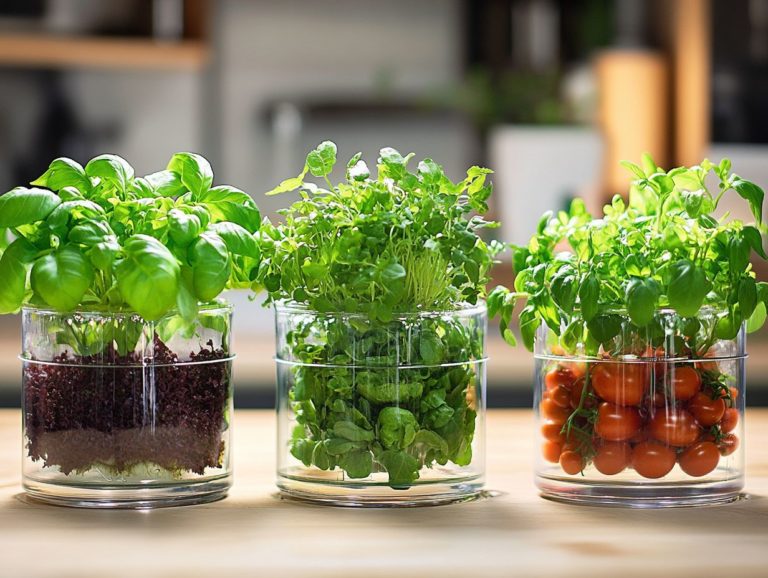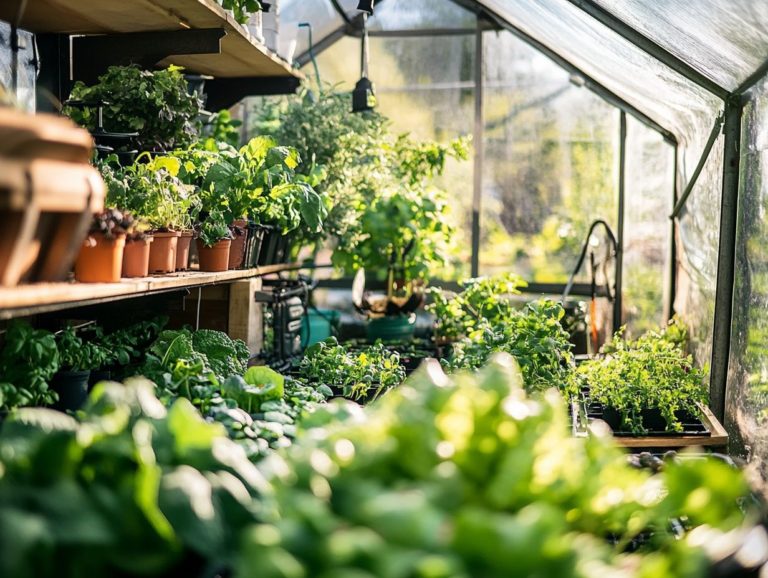“Selecting the Right Eggplant for Hydroponics”
Hydroponic farming is transforming the way you grow food, offering a soil-less alternative that maximizes your space and resources. Among the myriad crops suitable for this innovative approach, eggplant truly stands out due to its adaptability and delightful flavor.
Join us on this exciting journey into hydroponic eggplant farming! This article covers the essentials of hydroponic eggplant, which is particularly popular among enthusiasts. We’ll guide you from selecting the right variety to setting up your system and maintaining optimal growing conditions. Whether you re a seasoned gardener or just beginning your journey, you ll uncover valuable tips for successfully harvesting and utilizing your eggplant bounty.
Immerse yourself in the fascinating world of hydroponic eggplant cultivation!
Contents
- Key Takeaways:
- Choosing the Right Eggplant Variety
- Preparing Your Hydroponic System for Eggplant
- Planting and Caring for Your Eggplant
- Harvesting and Using Your Hydroponic Eggplant
- Frequently Asked Questions
- What are the benefits of growing eggplant hydroponically?
- What should I look for when selecting an eggplant variety for hydroponics?
- Do I need any special equipment to grow eggplant hydroponically?
- What nutrient solution is best for hydroponic eggplants?
- How do I know when my eggplants are ready to harvest in a hydroponic system?
- Can I reuse the nutrient solution for multiple growing cycles?
Key Takeaways:
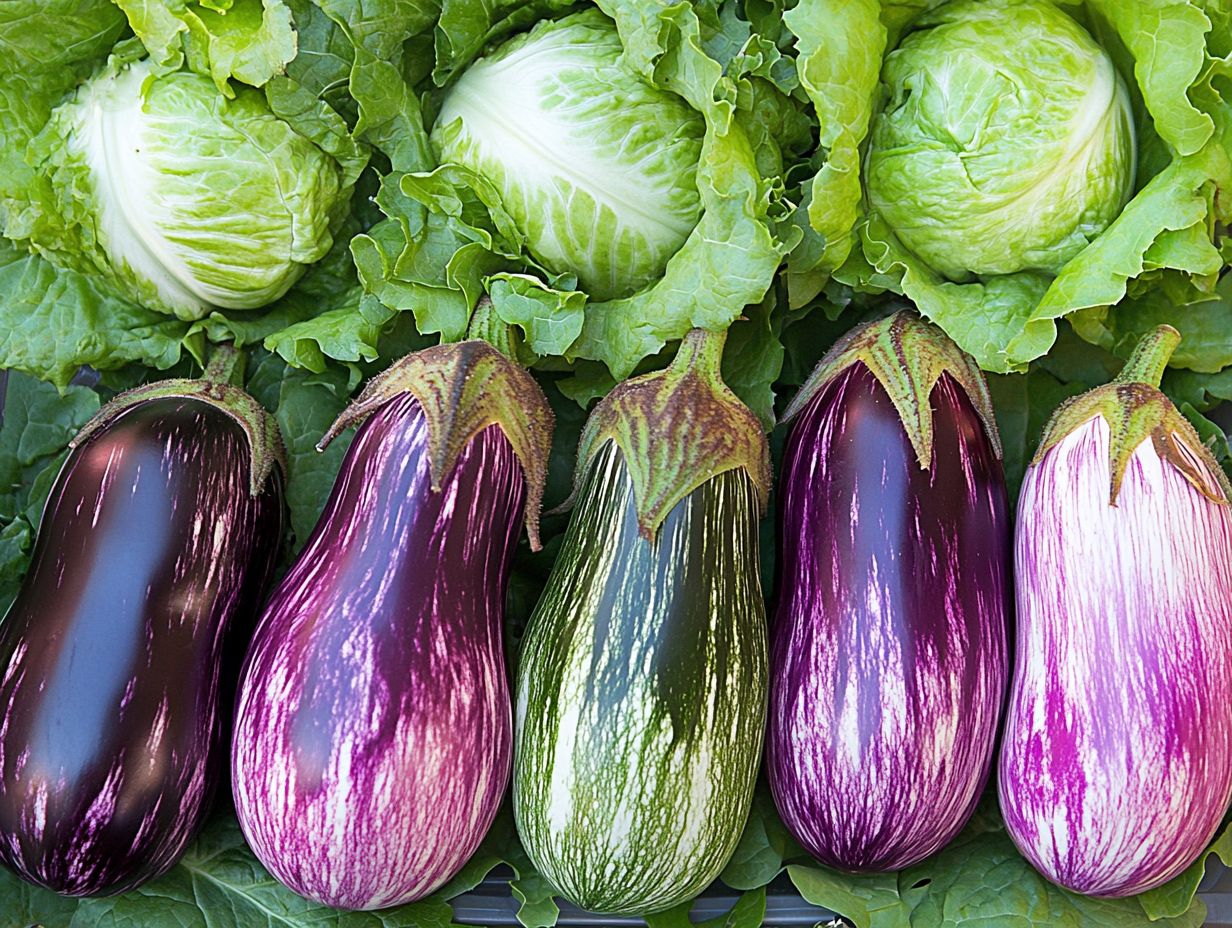
- Select the right eggplant type for hydroponic farming by considering growth rate, size, and how resistant it is to diseases.
- Maintain your hydroponic system properly to help your eggplants grow healthy.
- Use correct seeding techniques, maintain nutrient levels, and harvest at the right time for the best flavor.
What is Hydroponic Farming?
Hydroponic farming is an innovative way to cultivate plants without soil, using water mixed with nutrients that deliver essential nutrients directly to their roots. This technique is particularly advantageous for growing a variety of vegetables, such as hydroponic eggplant, which flourishes in controlled environments designed for optimal growth.
By embracing hydroponic technology, you can expertly manage crucial factors like monitoring water levels to ensure nutrients reach your plants effectively, maintaining optimal pH levels, and ensuring proper nutrient delivery systems are in place. This makes hydroponics an ideal approach whether you re an indoor gardening enthusiast or running a commercial operation.
Historically, hydroponics has roots in ancient civilizations that grew plants in waterlogged environments. It gained modern prominence in the 20th century thanks to advancements in nutrient solutions specifically designed for maximizing hydroponic eggplant growth and system design. Today, you have access to various hydroponic systems, such as Deep Water Culture, where plant roots are suspended in oxygen-rich water, and Ebb and Flow, which periodically floods the roots with nutrient solution. These methods offer flexibility to meet diverse agricultural needs.
Not only do these techniques enhance growth rates and yields, but they also play a significant role in sustainable farming practices. Hydroponics stands out as a pivotal solution in contemporary agriculture.
Start your hydroponic journey today and enjoy the fresh taste of home-grown eggplants!
Benefits of Growing Eggplant Hydroponically
Growing eggplant hydroponically offers amazing benefits! It presents a wealth of advantages over traditional soil-based methods, dramatically boosting both efficiency and yield of this beloved vegetable. In a controlled environment, you can meticulously manage optimal growth conditions like pH and humidity levels. Establishing ideal conditions for improving eggplant growth is essential for maximizing yields. Your eggplants will thrive, leading to healthier plants and a bountiful harvest.
By eliminating soil, you significantly reduce the risk of diseases and pests. Streamlined pest control is one of the many benefits of hydroponic farming. Managing eggplant pests effectively can lead to healthier plants and crops.
This method accelerates growth rates, enabling you to reap multiple harvests throughout the year far surpassing what you could achieve with soil cultivation. Plus, with a remarkable reduction in water usage compared to traditional farming, hydroponic systems champion sustainability and resource conservation.
Since nutrient solutions are directly available to the roots, your plants benefit from improved nutrient uptake. This results in richer flavors and enhanced nutritional profiles. When you combine this with diligent monitoring of environmental conditions, you not only maximize productivity but also ensure your eggplants remain healthy and vigorous throughout their growth cycle.
Choosing the Right Eggplant Variety
Choosing the right eggplant variety is crucial for achieving success in growing plants without soil. Each variety presents unique growth traits and nutritional needs that can greatly affect your results.
Consider popular options like the Fairy Tale Eggplant, Black Beauty, Rosa Bianca, and Long Purple. Each of these varieties boasts distinct flavors and sizes, making them ideal for various culinary applications and cultivation preferences.
By understanding the specific characteristics of these eggplants and pairing that knowledge with appropriate suitable growing mediums, such as Rockwool or coconut coir, for your hydroponic system, you’ll significantly enhance your chances of successful eggplant propagation.
Factors to Consider
When choosing an eggplant variety for your hydroponic farming venture, it’s crucial to weigh several factors. Start with the specific requirements of the eggplant, such as the optimal pH level of your nutrient solution and the humidity levels necessary for robust growth.
Understanding the temperature conditions for eggplant cultivation is vital, as this significantly influences overall plant health. The right system in place will make your eggplant crop flourish.
Consider the lighting conditions as well; eggplants thrive in bright, indirect light, which you can achieve by strategically placing your grow lights. Incorporating grow lights ensures your indoor gardening efforts yield healthy eggplants.
Different hydroponic systems also come into play certain varieties may flourish better in deep water culture compared to nutrient film techniques, which involve a thin film of nutrient solution flowing over the roots.
Nutrient management is another essential aspect to keep in mind. The right balance of nitrogen, phosphorus, and potassium will ensure superior fruit development. By selecting resilient eggplant varieties, including the Fairy Tale Eggplant, Black Beauty, and Long Purple that are well-suited to hydroponic systems, you’ll be thrilled with your increased yields and tackle fewer pest issues, ultimately making your cultivation experience both gratifying and efficient.
Recommended Varieties for Hydroponic Farming
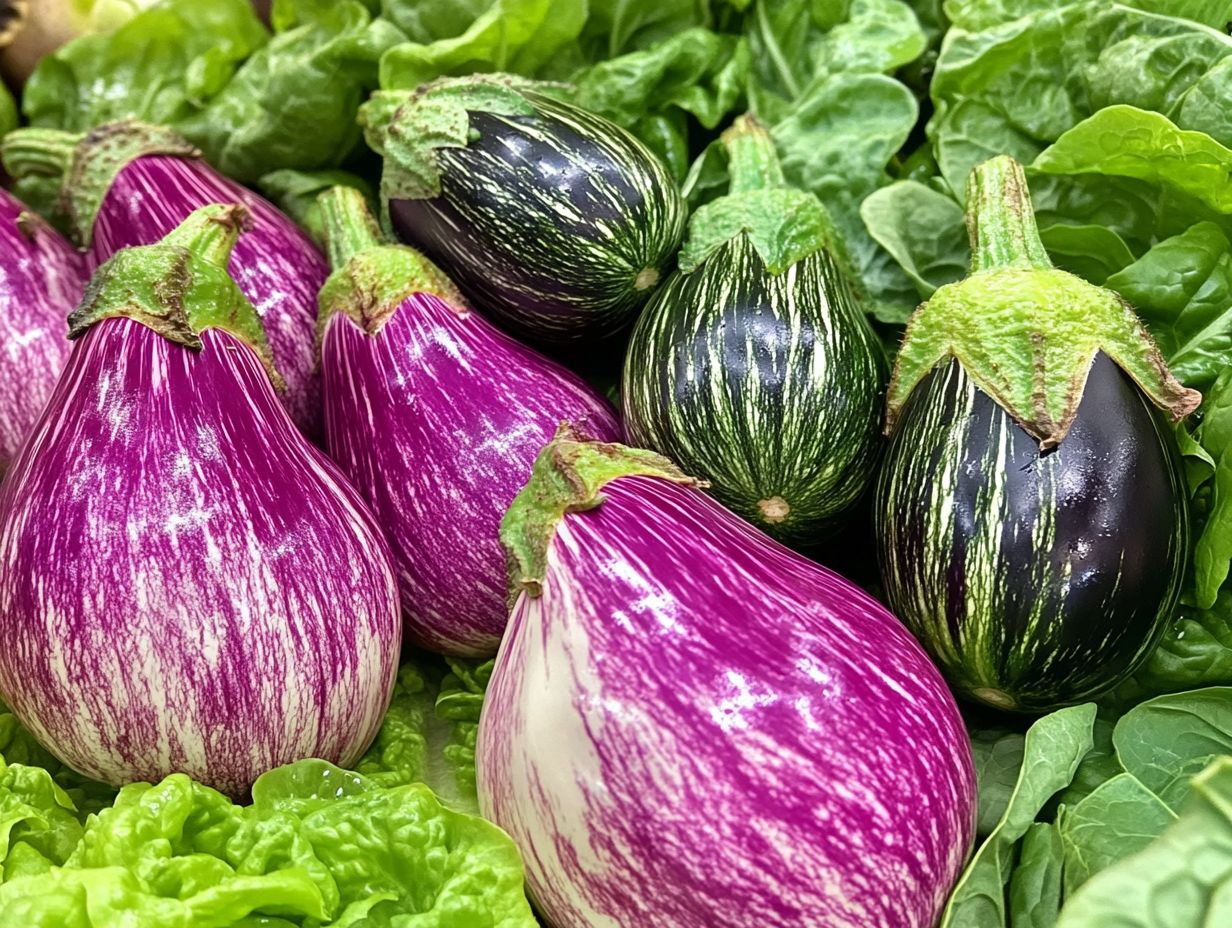
Several eggplant varieties are exceptionally well-suited for hydroponic farming. You ll want to consider them for your next venture. Take the Fairy Tale Eggplant, for instance. Its compact size and unique flavor make it a top choice for small spaces.
Then there s Black Beauty, a classic that delivers a rich yield and robust growth. Long Purple is another standout. It’s favored for its elongated shape and tender texture.
Each of these hydroponic eggplant varieties thrives in a well-maintained system. This ensures both quality and quantity in your harvest.
These varieties excel not only in growth and yield but also in their culinary applications. The Fairy Tale Eggplant is perfect for stir-fry or grilling, enhancing your meals with its sweet, mild flavor.
Black Beauty shines in traditional recipes, offering versatility that easily adapts to casseroles or saut s. Meanwhile, Long Purple brings a unique flair to your dishes, making them visually appealing while delivering a juicy, tender bite.
By understanding the characteristics of these eggplants, you can select the best options based on your available space and desired culinary uses.
Preparing Your Hydroponic System for Eggplant
Preparing a hydroponic system for cultivating eggplants demands careful planning and setup. This establishes the ideal conditions for successful seed germination and robust plant growth.
By selecting suitable growing mediums like Rockwool (a popular growing medium made from spun volcanic rock) or coconut coir (a biodegradable material made from coconut husks), you can significantly enhance root development and optimize nutrient delivery.
Coupling this with the right hydroponic system be it Ebb and Flow or Deep Water Culture will ensure effective management of water and nutrients. Grasping these essential components lays a solid foundation for a flourishing hydroponic eggplant crop.
Setting Up the System
Setting up a hydroponic system effectively requires you to select the right components. This includes a nutrient solution specifically formulated for eggplant, an appropriate growing medium, and the ideal water levels to promote healthy growth.
Incorporating grow lights is essential for indoor gardening. They mimic natural sunlight and provide the energy necessary for optimal photosynthesis.
Paying close attention to these elements is vital to establishing a successful hydroponic eggplant setup. Consider factors like pH levels and nutrient concentrations to ensure they remain within the optimal range for eggplants.
Your choice of growing medium be it rock wool, coco coir, or perlite can significantly impact root health and moisture retention.
Maintaining a balanced temperature and humidity by utilizing sensors and fans creates an ideal environment for thriving plants. Regularly monitoring these conditions allows you to make adjustments tailored to the specific needs of your eggplants.
Optimal Growing Conditions for Eggplant
For cultivating hydroponic eggplants, establishing optimal growing conditions is essential for healthy plant development. You need to maintain the right humidity levels, temperatures suited for eggplant growth, and precise pH levels in your nutrient solution.
Get to know your eggplant s nutrient needs to boost growth and yields! Understanding the specific nutrient requirements will ensure your plants receive the essential elements necessary for robust growth and productive yields.
Humidity plays a crucial role aim for a range between 50% and 70% to support proper transpiration and flower development. Temperatures should hover around 70 F to 80 F during the day, with slightly cooler conditions at night to mimic natural growing cycles.
It s vital to closely monitor the nutrient solution’s pH, ideally keeping it between 5.5 and 6.5 for optimal nutrient uptake. Regularly checking electrical conductivity levels is equally important, as this indicates nutrient strength.
This ensures your plants receive an adequate supply of essential elements like nitrogen, phosphorus, and potassium, all of which are vital for eggplant growth and fruiting as you grow eggplant in hydroponic systems.
Start your hydroponic eggplant journey today for fresh and delicious produce right at home!
Planting and Caring for Your Eggplant
Successfully cultivating hydroponic eggplant requires you to master essential techniques in propagation, seeding, and transplanting. These practices lay the foundation for robust initial growth in your indoor gardening setup.
Ongoing care is crucial. This includes proper watering, effective nutrient management, and pruning your eggplants on time. By adopting these practices, you will foster healthy development and maximize your yield, ultimately setting the stage for a bountiful hydroponic eggplant harvest.
Seeding and Transplanting Techniques
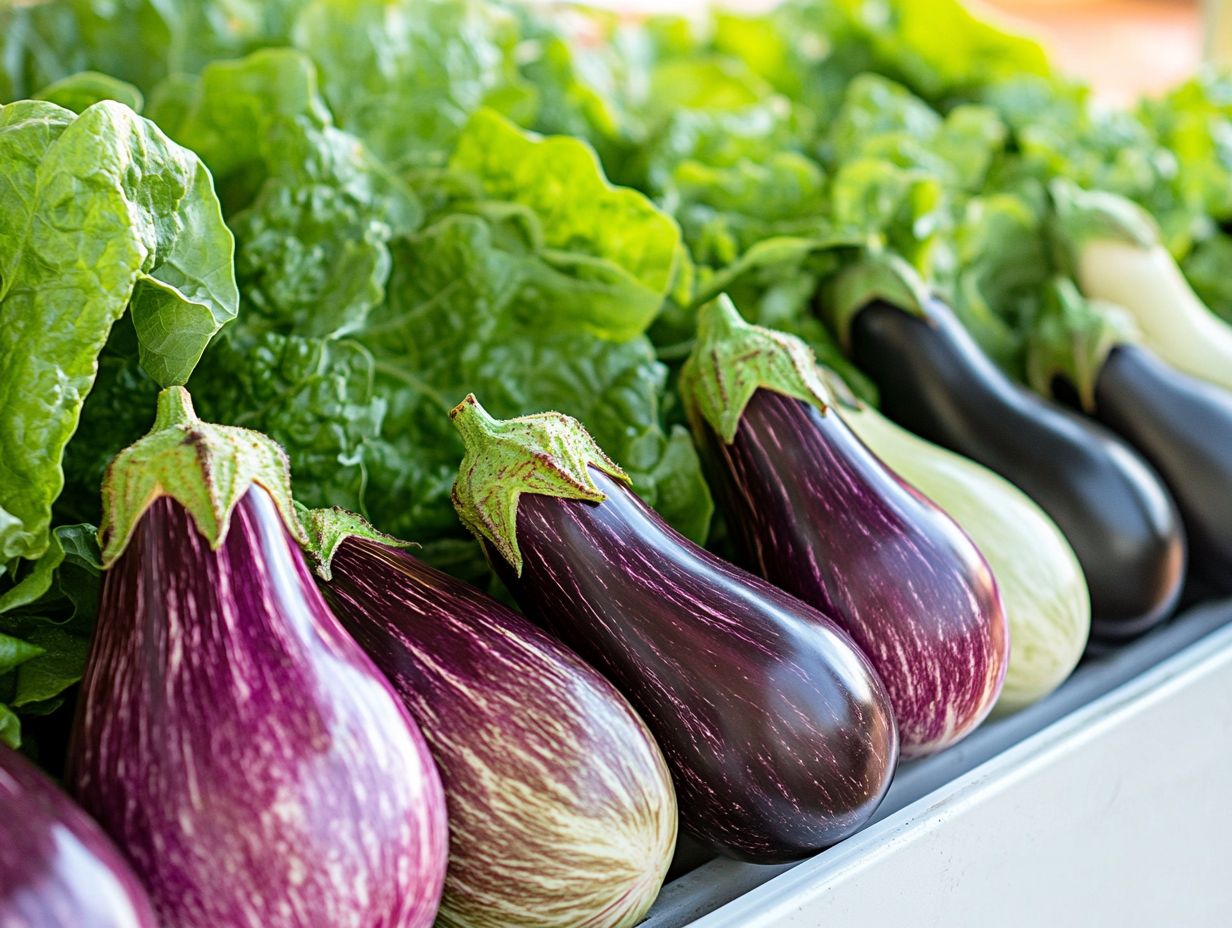
The journey of eggplant propagation starts with seed germination. Your meticulous attention to the growing medium and environmental conditions is key to successful seed development.
Once those seeds have sprouted, utilizing effective transplanting techniques will ensure that your seedlings transition smoothly into the hydroponic system. This allows them to establish robust roots and flourish in their new surroundings.
To cultivate hydroponic eggplants effectively, you must choose a high-quality seedling medium that retains moisture while providing sufficient drainage. When your seedlings develop two sets of true leaves, it s time to transplant them into nutrient solutions tailored to their growth stage, ensuring you maintain the right water levels.
Timing and technique during transplanting are crucial. Handling seedlings gently will minimize stress and reduce the risk of shock.
Be mindful of common challenges during this phase, such as overwatering or insufficient light conditions typical in indoor gardening. Monitoring environmental variables like pH, temperature, and nutrient levels becomes essential as you nurture your eggplants toward a bountiful harvest.
Proper Maintenance and Nutrient Management
Maintaining healthy eggplants in your hydroponic system demands your diligent attention to nutrient supply and water levels. These are crucial for effective practices in eggplant care.
You want to ensure that these plants receive a balanced nutrient supply throughout their growth cycle. Regular monitoring of the pH level is critical for eggplant health, as any fluctuations in the nutrient solution can impact nutrient uptake and the overall vigor of your plants.
By implementing effective maintenance practices, you can foster robust growth and achieve high yields. For instance, regularly checking water levels is essential to prevent drought stress.
Ensure that your nutrient solution remains well-mixed and readily available. Utilizing pH meters and EC (electrical conductivity) testers gives you the power to make informed adjustments, creating optimal conditions for your plants.
Establishing a feeding schedule that aligns nutrient supply with the eggplant s growth stages can greatly benefit your efforts in pest control and disease management. Proactive management boosts the overall health and productivity of your crop.
It also reduces the risk of diseases and nutrient deficiencies that could compromise your final harvest.
Harvesting and Using Your Hydroponic Eggplant
Harvesting your hydroponic eggplant at the optimal moment is essential for maximizing both flavor and nutritional value, especially for popular varieties like Rosa Bianca and Long Purple.
Timing is everything! By employing well-timed harvesting techniques, you can ensure that your eggplants reach their peak quality.
Once you’ve gathered your bounty, the possibilities are truly exciting! Incorporate eggplant into your culinary creations or integrate it into a health-conscious diet, enhancing your meals with various eggplant nutrients.
Familiarizing yourself with the best practices for harvesting not only elevates the quality of your produce but also enriches your overall gardening experience.
When and How to Harvest
Knowing when and how to harvest eggplant is crucial for achieving the best growth and quality in your growing eggplants without soil. Overripe fruit can turn bitter and unpalatable, so timing is everything to maintain optimal growth conditions. The ideal moment to harvest is when the eggplant reaches a glossy sheen and feels firm to the touch.
By employing proper harvesting techniques, you can help ensure that the plant remains productive for future yields. To determine ripeness, consider the fruit’s size and color, which varies by variety but typically showcases a vibrant purple or green hue, characteristic of different eggplant varieties.
When it s time to harvest, wield a sharp pair of garden shears or scissors. This approach minimizes stress on the plant and prevents any damage to the stem or surrounding leaves. Instead of yanking the fruit, gently cut it from the vine, leaving a small portion of the stem attached to maintain freshness.
By following these straightforward practices, you can ensure that your hydroponic system remains productive, delivering high-quality eggplants and preventing common eggplant diseases throughout the growing season.
Creative Ways to Use Your Eggplant Harvest
After you’ve harvested your hydroponic eggplant, get ready to transform your meals! Discover countless creative avenues to incorporate this culinary gem into your dishes and maximize your eggplant crop. This versatile vegetable shines in a variety of preparations, whether you’re grilling, roasting, or tossing it into stir-fries and casseroles.
You can unlock a treasure trove of recipes that showcase its distinctive flavor. Imagine crafting a vibrant Mediterranean masterpiece by layering sliced eggplant with marinara sauce and melted mozzarella. This creates an eggplant parmesan that s bound to impress, showcasing the best practices for eggplant care.
Alternatively, consider blending diced eggplant into rich curries to enhance both texture and nutrition. Don t forget about the grill! Halved eggplant drizzled with olive oil and a sprinkle of herbs transforms into a smoky side that complements any barbecue beautifully, especially when paired with fresh summer vegetables.
By experimenting with an array of spices and cooking techniques, you ll ensure that the eggplant s subtle taste takes center stage, enhancing your vegetable gardening experience.
Frequently Asked Questions
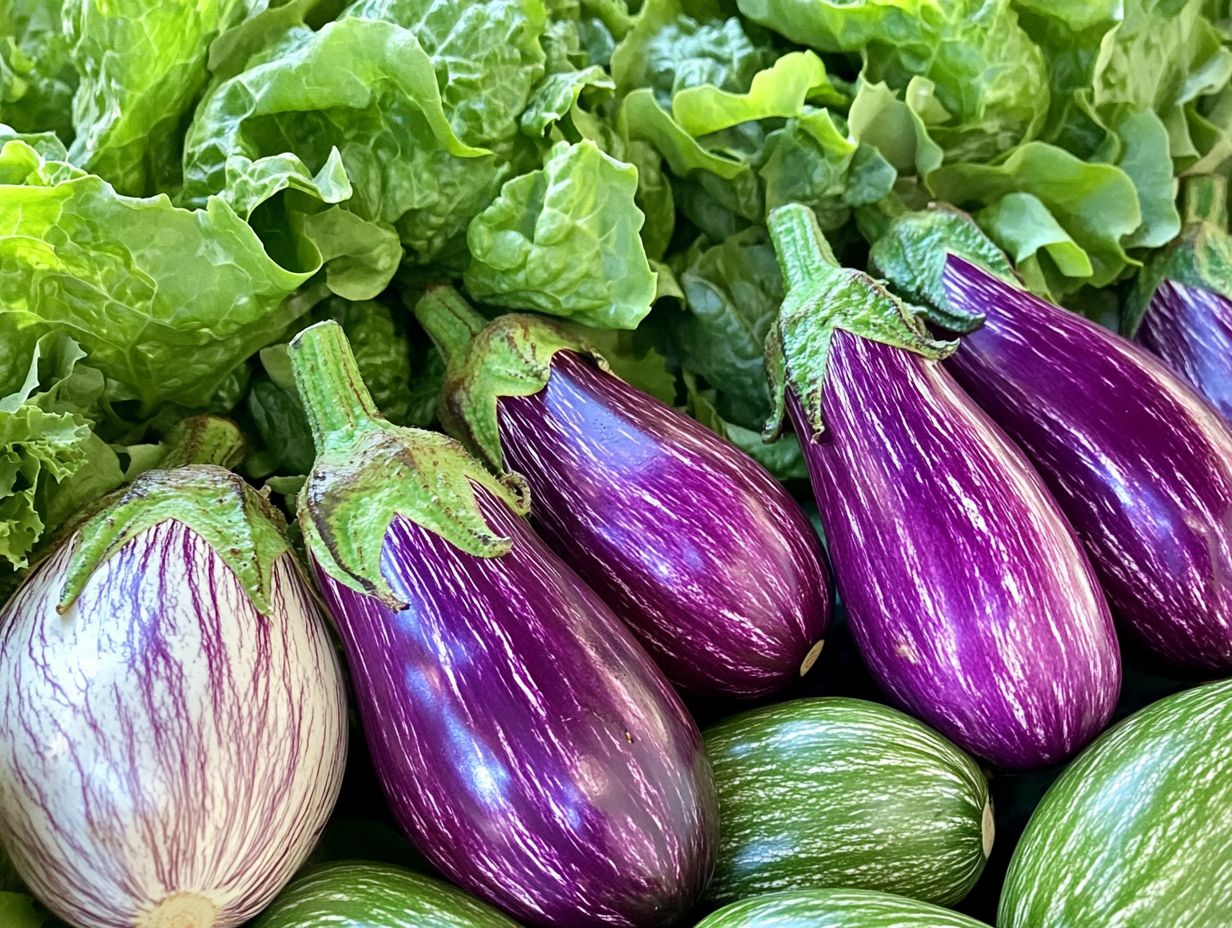
What are the benefits of growing eggplant hydroponically?
Growing eggplant hydroponically allows for more control over growing conditions, leading to healthier and more abundant plants. This method also eliminates the need for soil, making it a great option for those with limited space or poor soil quality.
What should I look for when selecting an eggplant variety for hydroponics?
When selecting an eggplant variety for hydroponics, look for one that is known for its high yield and compact growth habit, such as Black Beauty or Rosa Bianca. You may also want to consider smaller eggplant varieties, as they are better suited for container growing.
Do I need any special equipment to grow eggplant hydroponically?
While there are some specialized hydroponic systems designed specifically for growing eggplant, you can also use a basic system with a nutrient solution and grow lights, essential for proper eggplant propagation. Ensure that your system provides proper support and drainage for the plants.
What nutrient solution is best for hydroponic eggplants?
Eggplants require a balanced nutrient solution with a higher concentration of potassium and phosphorus, crucial for their growth and overall health. Look for a hydroponic fertilizer specifically formulated for fruiting plants, and be sure to follow the recommended feeding schedule.
How do I know when my eggplants are ready to harvest in a hydroponic system?
Eggplants are typically ready to harvest when they are shiny and firm, with a dark purple color, indicating optimal growth conditions. Depending on the variety, this can range from 60 to 90 days after planting. Regularly check the plants and harvest them when they reach the desired size.
Can I reuse the nutrient solution for multiple growing cycles?
Yes, you can definitely reuse the nutrient solution for multiple growing cycles! Just keep an eye on the pH and nutrient levels to protect your eggplants from pests.
As the plants consume nutrients, you may need to add more to keep the solution balanced. It’s also best to replace the solution entirely after 3 or 4 cycles to prevent nutrient deficiencies.

